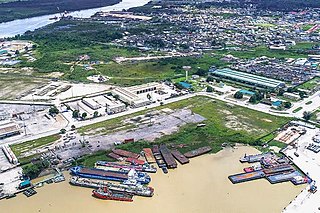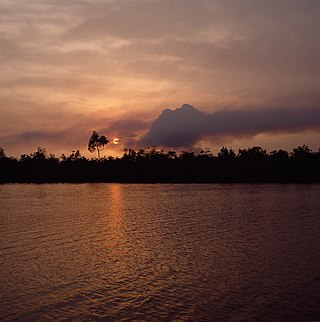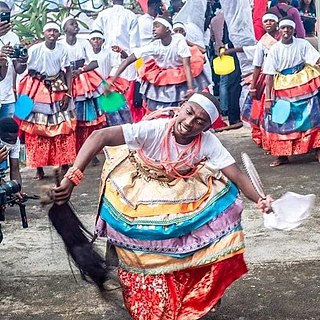
The city of Warri is an oil hub within South-South Nigeria and houses an annex of the Delta State Government House. Warri City is one of the major hubs of the petroleum industry in Nigeria. Warri, Udu, Okpe and Uvwie are the commercial capital of Delta State with a population of over 311,970 people in 2006. The city is the indigenous territory of Itsekiri, Urhobo and Ijaw people.

Bayelsa is a state in the South South region of Nigeria, located in the core of the Niger Delta. Bayelsa State was created in 1996 and was carved out from Rivers State, making it one of the newest states in the federation. The capital, Yenagoa, is susceptible to high risk of annual flooding. It shares a boundary with Rivers State to the east and Delta State to the north across the Niger River for 17 km and the Forçados River for 198 km, with the waters of the Atlantic Ocean dominating its southern borders. It has a total area of 10,773 square kilometres (4,159 sq mi). The state comprises eight local government areas: Ekeremor, Kolokuma/Opokuma, Yenagoa, Nembe, Ogbia, Sagbama, Brass and Southern Ijaw. The state is the smallest in Nigeria by population as of the 2006 census. Being in the Niger Delta, Bayelsa State has a riverine and estuarine setting, with bodies of water within the state preventing the development of significant road infrastructure.

Ughelli is a town in Delta State, Nigeria, and one of the 24 kingdoms that make up the Urhobo Nation. It also serves as the headquarters of Ughelli North local government area of Delta State. The city is indigenous to the Urhobo ethnic nationals, but there is a mixture of several other tribes from the country & abroad. It is an industrial and agricultural spot of Delta State.

The Itsekiri are one of the Yoruboid subgroup of Nigeria's Niger Delta area, They speak a Yoruboid language and can be found in Delta State. The Itsekiris presently number 2.7 million people and live mainly in the Warri South, Warri North and Warri South West local government districts of Delta State on the Atlantic coast of Nigeria. Significant communities of Itsekiris can be found in parts of Edo and Ondo states and in various other Nigerian cities including Lagos, Benin City, Port Harcourt and Abuja. Many people of Itsekiri descent also reside in the United Kingdom, the United States and Canada. The Itsekiris are closely related to the Yoruba of South Western Nigeria and also close to the Okpe people and Edo peoples. The Itsekiris traditionally refer to their land as the Kingdom of Warri or 'Iwere' as its proper name – which is geographically contiguous to the area covered by the three Warri local government districts. The area is a key centre of Nigeria's crude oil and natural gas production and petroleum refining and the main town Warri forms the industrial and commercial nucleus of the Delta State region.
Agbassa is the name of one of the two Urhobo kingdoms in Warri South Local Government, Delta State, Nigeria, the other being Okere-Urhobo. The name 'Agbassa' is of British origin derives from its original name 'AGBARHA', which is still in use. The current king is H.R.M Orhifi Ememoh II,.
Udu is a Local Government Area in Delta State, Nigeria with its local government headquarters at Otor-Udu. It has a population estimate of approximately 100,000 people. It is one of the Urhobo kingdoms, has its own king, or ovie. The town is about 10 minutes drive from Osubi Airport

Uvwie (/hu-we-ɛ/), is a principal Urban Local Government Area in Delta State. It lies along the Warri River and it is one of the twenty-four Urhobo Kingdoms. The entirety of the LGA is conurbated with the city of Warri, making it a greater part of Warri metropolitan area
Otor Udu is a town in Delta State in Nigeria. It is the local government headquarters for the Udu area and is the ancestral home of people connected or related to Udu.
Oghara Kingdom is a town located in Ethiope West Local Government Area of Delta State, Nigeria.

Abraka, is a town in Delta state, Nigeria. It is also home to two of the main 24 urhobo kingdoms. It is mostly known as a university town and has the main campus of the Delta State University located there. Abraka town is a favourite destination for domestic and international tourists. The Abraka beach is famous for its natural flowing spring water, and has sports recreational facilities for outdoor activities like canoeing, fishing, swimming, barbecue and picnicking.
The Warri Crisis was a series of conflicts in Delta State, Nigeria between 1997 and 2003 between the Itsekiri, the Ijaw, and the Urhobo ethnic groups. Over 200,000 people were displaced by the Warri conflict between 1999 and 2006. Over 700,000 people were displaced during this period by violence in Delta State overall.
Justice Victor Ovie Whisky was chairman of the Federal Electoral Commission (FEDECO) appointed by President Shehu Shagari during the Nigerian Second Republic. He held office from 1980 to 1983.
The Urhobos are people located in southern Nigeria, near the northwestern Niger Delta.
The Agbon Kingdom is one of twenty-four subunits of the Urhobo people that have been in existence since before the rise of the Benin Empire in the 1440s and before the arrival of the Portuguese in the Western Niger Delta in the 1480s.
M. G. Ejaife was an Urhobo nationalist from Okpara Inland and the first principal of the premier Urhobo College Effurun,Uvwie. He was one of two recipients of scholarship awards from Urhobo Progress Union during World War II years. He returned to Nigeria after his graduation with a B.A. degree of Durham University in 1948, thus becoming the first Urhobo graduate. He then became the founding Principal of Urhobo College, Effurun. He brought that famous secondary school to its great heights in many fields. Mr. Ejaife later served in many other capacities in Urhobo affairs. He was Urhobo's first Senator, serving with distinction in Nigeria's Upper Chamber during the country's First Republic.
Irri is located in the Isoko South local government area of Delta state, Nigeria. It is one of the petroleum producing communities in Nigeria. It is bordered by Uzere, Aviara, Oyede, Idheze and Oleh. Descendants of Irri migrated to form other small villages and towns, such like Ada, Idheze, Ikpide, Ivrogbo, Iwreogboko, Canaan Irri, Ivori, Uro Irri, etc, and they are usually referred to as children of Irri Kingdom. The people are referred to as Emo Irri, which means children of Irri.

Onigu Otite was a Nigerian sociologist. He was among the first set of students to attend the first indigenous Nigerian university - University of Nigeria, Nsukka. He wrote several books including The Urhobo People, On the Path of Progress, Ethnic Pluralism and Ethnic Conflicts in Nigeria, and Introduction to Sociology which he co-authored with William Ogionwo. The Urhobo Studies Association USA Chapter regard him as one of the earliest Urhobo scholars to focus attention on the culture and history of the Urhobo People of the Niger Delta.
The Niger Delta Greenland Justice Mandate (NDGJM) is a militant group operating in Nigeria's Niger Delta region. The group was founded on August 2, 2016 in Delta State and is composed mainly of ethnic Urhobos, and a fairly large number of members belonging to the Isoko ethnic group.
Owhrode is a community in the Udu Local Government Area of Delta State, Nigeria.
Wado City is the proposed name of the urban, commercial and industrial Urhobo territories in Warri City in Delta State, Nigeria. It shares boundaries with Warri North and Warri South West.






